Product photography: one of the single most important aspects of your social media eCommerce campaigns.
Summary
- Why is eCommerce Photography So Important?
- How Do I Go About Choosing a Best Camera Lens for Product Photography?
- Consider What Else Might Affect Your Product Photography?
7 Best Lenses for Product Photography | It's All in The Camera Lens
Lenses
- The Canon EF 24-70 mm f/2.8L II
- The Sony FE 50 mm f/1.8
- The Nikon AF-S DX Micro-NIKKOR 40 mm f/2.8G
- The Sony 30 mm f/3.5
- The Sigma 24-105mm f/4.0
- Canon TS-E 135 mm f/4L
- The Sony FE 90mm f/2.8
While it would be incredibly difficult to pinpoint the lens that will work best in your particular line of work, we wanted to present the best lenses for product photography that work across the board to help you get better, faster, and overall cheaper results. After all, if you were able to spend less time and money promoting due to the fact that you were receiving more clicks and conversions from a single picture, would you be more inclined to invest?
Social media marketing isn't cheap. And eCommerce photography, (at least high-quality eCommerce photography) can be one of the more expensive parts of the puzzle.
So if you're going it alone, we want to be there to help every step of the way, beginning with choosing the right lens for the job.
Ready to get started?
1) ECOMMERCE: WHY GOOD PRODUCT PHOTOGRAPHY MATTERS FOR CONVERSIONS
2) RESTAURANT MARKETING FOR BEGINNERS: THE ONLY GUIDE YOU NEED 2 SUCCEED
3) 5 SUPERB VIDEO MARKETING TRICKS FOR SOCIAL MEDIA
Let's find the best lenses for product photography.
The Canon EF 24-70 mm f/2.8L II
This lens is pretty versatile, no matter what you're trying to "shoot and blow up" and will prove to be an incredible addition to your eCommerce photography equipment.
The Canon EF 24-70 mm f/2.8L II USM is characterized by super low and ultra-low dispersion, and can pretty much guarantee incredible product photography, no matter the subject.
Are products highly reflective? No problem! The Canon EF 24-70 mm f/2.8L II USM is made with intricate lens elements, each covered with a Super Spectra anti-reflection coating that helps control lighting and gives your products an incredibly professional look and feel.
Pros Include:
- Great sharpness over the entire zoom range, even when the aperture is open!
- Featuring a Hyper-Fast Auto-Focus System
- Minimal chromatic aberration
- Features a glare control system
- Water and Dirt Proof
- The front and back sides of the lens have DUST RESISTANT coating!
Cons Include:
- When the aperture is open, there is weak sharpness at the edges of the frame.
- Isn't a good choice for capturing the beauty of bokeh in a frame.
The Sony FE 50 mm f/1.8
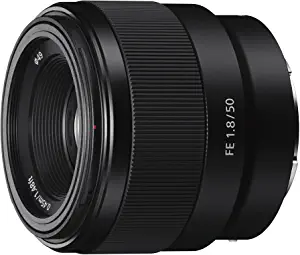 This lens works well for both products AND subjects due to its ability to take stunning photographs even in the poorest of light settings.
This lens works well for both products AND subjects due to its ability to take stunning photographs even in the poorest of light settings.
The /1.8 aperture focuses on some elements keeping unnecessary elements blurred to provide better visibility. To give you an idea: Some eCommerce photographers prefer this camera to a lightbox. It's that awesome.
You can say goodbye to distortion and chromatic aberration with the Sony FE 50 mm f/1.8. It features Optical Steadyshot, which will help prevent blurring and will guarantee sharp pictures whether you're using a tripod or not.
Pros Include:
- When an aperture is open, sharpness is still peak
- Minimal chromatic aberration
- Excellent contrast
- Incredible bokeh shots
- Easily portable
Cons Include:
- The auto-focus feature is noisy and loud
- Chromatic aberrations may sometimes occur in bokeh mode
The Nikon AF-S DX Micro-NIKKOR 40 mm f/2.8G
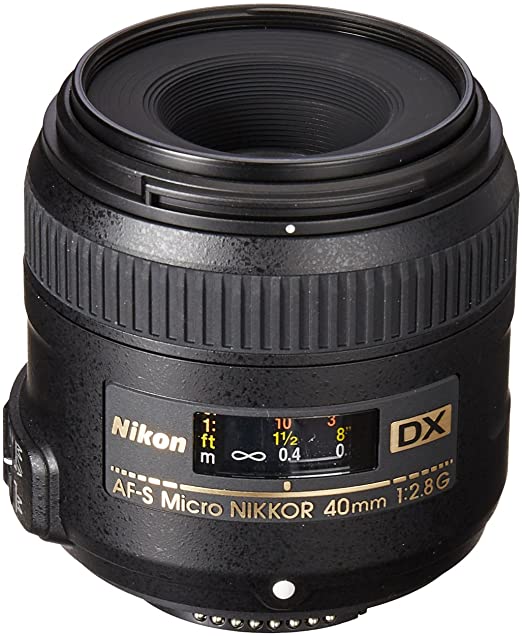 This compact and efficient little lens is one of our favorites for jewelry photography. (And not just because of the price tag.)
This compact and efficient little lens is one of our favorites for jewelry photography. (And not just because of the price tag.)
With Nikon AF-S DX Micro-NIKKOR 40 mm f/2.8G ability to take wide-angle shots of different jewelry pieces, it's perfect for capturing every tiny detail in perfect focus.
With a brilliant 1:1 shooting scale, it is one of the best lenses for close-ups, with a minimal focal distance of 16 cm. With a high ceiling for brightness, (maximum aperture value is f/2.8) you'll be able to capture objects in the background while keeping it blurred.
This also means you can get quality shots even in dim light.
Pros Include:
- The maximum ratio is 1:1
- Convenient/Portable
- Takes excellent bokeh
- Aperture open and pictures are just as sharp
- Featuring minimal chromatic aberration
Cons Include:
- The only complaint we have? Slow auto-focus.
The Sony 30 mm f/3.5
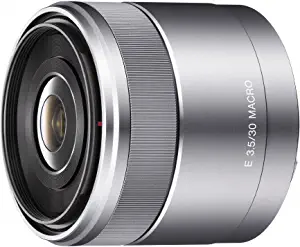 A pretty compact wide-angle macro lens with a zoom ratio of 1:1, the Sony 30 mm f/3.5 allows for pictures taken at short distances by taking full-size pictures of tiny aspects and then saving them on the matrix. The minimal shooting distance is 2.4 cm; with a minimal focus distance of 9.5 cm.
A pretty compact wide-angle macro lens with a zoom ratio of 1:1, the Sony 30 mm f/3.5 allows for pictures taken at short distances by taking full-size pictures of tiny aspects and then saving them on the matrix. The minimal shooting distance is 2.4 cm; with a minimal focus distance of 9.5 cm.
These are the ideal technical features for jewelry photography where even the smallest details are of crucial importance.
Special qualitative optics featuring aspheric lenses and glass low-dispersion details provide excellent accuracy and sharpness.
One of our favorite aspects of this lens is the fact that it doesn't change lengths while you're trying to get a particular shot. This makes it incredibly useful for close-ups and
Pros Include:
- Perfect sharpness
- Hood and tripod collar
- 1:1 magnification
Cons Include:
- Expensive
- Zero picture stabilization
The Sigma 24-105mm f/4.0
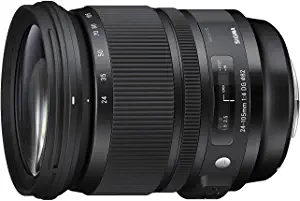 While this lens is a little slow on the action, (it takes more time to get a clear picture) the results are well worth the effort. Clear, beautiful and flawless, Sigma 24-105mm f/4.0 features axial chromatic aberration and unsurpassed resolution, even at the very edges of the frame!
While this lens is a little slow on the action, (it takes more time to get a clear picture) the results are well worth the effort. Clear, beautiful and flawless, Sigma 24-105mm f/4.0 features axial chromatic aberration and unsurpassed resolution, even at the very edges of the frame!
You will want to keep in mind that the minimum focusing distance is 45 cm no matter the focal length.
Pros Include:
- Best for furniture photography
- 4.4x zoom available
- Regular f/4 aperture
- Excellent sharpness
- Fantastic optical stabilization
- Full-frame coverage
- USB dock accessible
Cons Include:
- Possible distortions while zooming
The Canon TS-E 135 mm f/4L
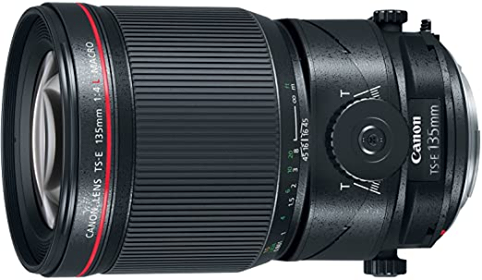 Featuring convenient perspective control, this lens will blow your mind when it comes to photographing products and most namely, edible items. The convenient and incredible tilt shift lens ensures high image quality and superb color and sharpness.
Featuring convenient perspective control, this lens will blow your mind when it comes to photographing products and most namely, edible items. The convenient and incredible tilt shift lens ensures high image quality and superb color and sharpness.
With the power to control the perspective and depth of field, Canon TS-E 135 mm f/4L is best lens for product photography. Not to mention stepwise tuning, excellent optical design, and precise GMo optics that blow this lens out of the water and make for low distortion, excellent resolution.
You'll also be able to catch that much-needed macro photography at a 1: 2 scale.
Pros Include:
- Macro shooting available at 1:2 scale
- Featuring an optical axis that can tilt ± 10 ° and the shift is ± 12 mm
- Sharpness is perfect
- No chromatic aberration
- The shift block and the axis tilt block can be rotated independently
Cons Include:
- The only con for this would be the price. It's expensive, but if you want to make sales and need the perfect camera lens for good product photography, this is the lens for you.
The Sony FE 90mm f/2.8
Hands down one of the best distance shooters for capturing those delectable bites, soaps, bath bombs and other products, the Sony FE 90mm f/2.8 is one of our personal favorite best lens for product photography. Thanks to a very narrow field of view, you can get excellent award-winning magazine, cover photos, advertisements and more with one of the best Sony product photography lenses on the market.
And all of this without sacrificing straight perspective lines!
This is particularly awesome macro lens for professional product photography because it allows for 1:1 magnification.
This incredible lens was originally created for a full-frame mirrorless camera, but you can also use it for the Sony NEX by simply adding an APS-C sensor
Pros Include:
- Dust and moisture protection
- Continuous mode focus lock
- 3-position autofocus distance limiter
- F/2.8 aperture means forever sharpness!
Cons Include:
- Auto-focus isn't great if you're shooting for macro.
Why is eCommerce Photography So Important And How Can
If you're a product photographer, you'll know that the photos that you take of your products can mean the difference between through the roof sales and a flat line report.
We wrote a whole blog about this if you're interested in taking a further glance, but the three biggest reason why product photography is so important and why it's so vital to be sure you have the best lens for good product photography results is because:
- People are visual and when buying online, they heavily rely on good visuals. This means bad visuals=no sales.
- Good product photography draws customers attention to your product and helps raise brand awareness.
- Good photography DRIVES SALES, clicks, conversions and engagement.
How Do I Go About Choosing a Best Camera Lens for Product Photography?
Remember: your lens is just an extension of your camera. It's just as important when it comes to good, quality photographs, so don't just buy any lens and expect incredible results.
One super important thing to keep in mind is that you need to find a camera lens which technical capabilities correspond with your needs when it comes to your product photography journey.
For instance, a good furniture photography lens is going to be different than a good jewelry photography lens.
If you need a more "one size fits all" sort of product photography lens, macro lenses typically have the best chances of turning out a good product photo due to the 1:1 ratio and the minimum focal length being shorter than most other lens types.
To help you narrow it down, we've put together a little cheat sheet.
#1 Check the Focal Length
A good focal length will vary from product to product, so this is going to depend on your particular industry.
#2 The Overall Quality
Getting a low-quality lens, while inexpensive, will give you low-quality results. Shoot for high-quality photos and high-quality sales.
Hint: weight is usually a pretty good indicator of quality because cheap lenses are made from plastic and high-quality lenses are made from metal and glass.
Consider What Else Might Affect Your Product Photography
While a great product photography lens can really turn out a good picture, the bad lighting and unsteady hands can steal the thunder pretty quickly.
Give your eCommerce store a chance to succeed with tools like studio lights, drapes, editing software, and a tripod to ensure you get the most bang for your buck. Good product photography lenses are expensive, right? So make the most of it!
Helpful (and affordable!) tools can include:
- A close-up filter will make grabbing that macro shot without a macro lens a little easier. (And cheaper.)
- A polarizing filter will reduce the reflections that can appear when photographing liquids, glass, and plastics.
- A macro reversing ring is another great and affordable way to get incredible product photography shots on the cheap-er.
Conclusion
When choosing the best lens for product photography, it's important to remember that the most expensive lenses don't necessarily have the best results, so look over our pros and cons carefully, (bookmark the page if it's helpful!) and compare your overall favorites, as well as make sure it lines up with your eCommerce photography needs.
Do you have any insight into the secrets behind finding the perfect product photography lens? Let us know in the comments!



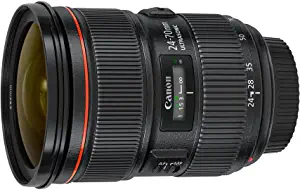
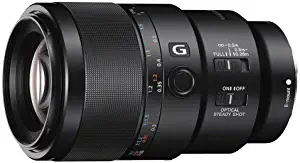








Your Comments :